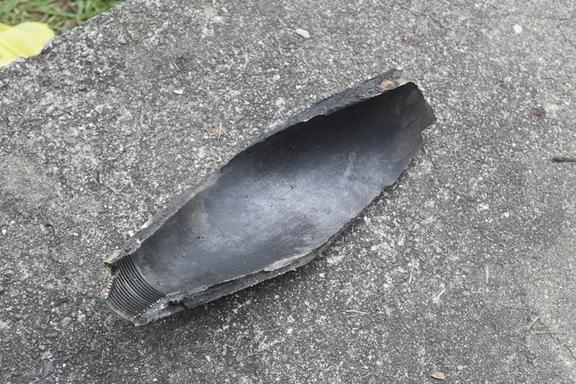
By Dominic Godfrey, RNZ Pacific journalist
A deadly explosion in the Solomon Islands capital has caused fear and confusion about the ongoing threat posed by hidden munitions left over from World War II.
A central Honiara residential area was rocked on Sunday by the detonation of a buried howitzer shell which left one person dead and three others injured, two seriously.
The 101mm cannon round exploded in the Lengakiki area where four youth members of the Kukum Seventh Day Adventist Church had been holding a fund-raising barbecue.
An elder from the church, Lloyd Tahani, said the open fire they were cooking on was directly above the shell.
“Maybe, because they had been cooking a long time, it triggered the bomb to explode,” said Tahani.
He said the young man who was killed, who he identified as Raziv Hilly, “was hit directly” as he was cooking beneath a mango tree while the other three injured people were standing nearby.
The incident has left the people in Honiara shocked and scared, said Tahani.
‘Fear to the residents’
“It brought fear to the residents in Honiara because, you know, Honiara is where the battle between Japan and the USA finishes,” he said referring to the 1942-43 Guadalcanal campaign.
“You just don’t have a comfortable environment when such things happen. People just feel that we don’t know whether a bomb is still sitting under your house or somewhere where you’re staying.”
Raziv Hilly was a leader in the Kukum SDA Church’s youth ministry, according to Tahani, who will be sadly missed.

He was one of the country’s future leaders, according to a member of the Solomon Islands Parliament.
Peter Kenilorea Jr, who knew Hilly and his family, said he was a much respected youth leader.
“He was a very promising leader here in the Solomon Islands. He had a lot of respect,” said Kenilorea.
“He was one that had a lot of potential for us in the Solomons so it’s just sad to see him go this way. So the family is grieving at the moment and we send our love and our condolences.”
Hilly was also one of the country’s top aviation engineers whose loss is being mourned by his colleagues at the Ministry of Aviation and Communication, according to the Solomon Star.
The other three injured members of the church remain in hospital with one having received surgery on Monday for her serious injuries.
Munitions recovery ongoing
With Solomon Islands seeing some of the most intense conflict in WWII, the country remains littered with bombs, with hidden munitions an ongoing threat across the country.
The head of the police’s explosive ordnance disposal team, Clifford Tunuki, said they had responded to a number of unexploded ordnance (UXO) reports over the years in the capital.

“We keep a data base of the response we conducted and we have checked the history of that area,” said Tunuki, referring to Lengakiki.
“Our research indicates that it is no more contaminated with UXO than other parts of the capital.”
The last one was a mortar shell discovered in 2016, said Tunuki.
“Unfortunately citizens of Honiara can find a UXO anywhere and at any time of the year,” he added.
Norwegian deaths
Last September, two members of a Norwegian NGO working on munitions recovery and disposal were killed when they removed ordnance into Honiara where they had been staying.
Tunuki said he could not comment on that case as the investigation into their deaths was still under way.
The United States, which along with Japan is responsible for most of the country’s UXO’s, said in a statement through its embassy in Papua New Guinea that it is “deeply saddened to hear of the tragic incident in Honiara this past weekend and mourn[s] the loss of life.”
“The United States government, through our Department of Defense, will continue to support efforts to remove unexploded ordnance from Solomon Islands.
“Among these efforts is our ongoing partnership with Norwegian People’s Aid, which has worked in Solomon Islands since 2019 to identify and dispose of unexploded ordnance.”
But work by the Norwegian People’s Aid (NPA) was suspended last year following the deaths of the Australian and British team members in Honiara, according to Tunuki.
Previously, the Australian and New Zealand military had removed more than 1000 World War II era munitions as part of Operation Render Safe.
Told to hire cleaning company
Meanwhile, the owners of the site of Sunday’s blast have been told to hire a clearing company because there are not enough police resources to check their land.
Tunuki said the scene had been secured and no other threats were detected.
But he said the landowners have been told to hire a private clearing company to check surrounding grounds.
“The problem for us to clear populated areas, then we would need more manpower and resources than we currently have.
“Until then, we can only respond to the community reports that they have located UXO and then we attend to [them].”
Tunuki said there were more recruits being trained for that purpose.
More knowledge needed
But more knowledge and awareness about the potential for UXO’s beneath existing structures and in established neighbourhoods may be needed, according to Peter Kenilorea Jr.
New commercial developments were cleared of munitions but people were not likely to expect them in the yards of existing homes, he added.
“I guess an increase of awareness needs to be done by authorities to alert people on the certain steps that they might need to take, even in an already established area, involving fires and then such,” said Kenilorea.
“I think such awareness needs to come back much more prominent in our discourse here in Honiara and Solomon Islands in general.”
This article is republished under a community partnership agreement with RNZ.
